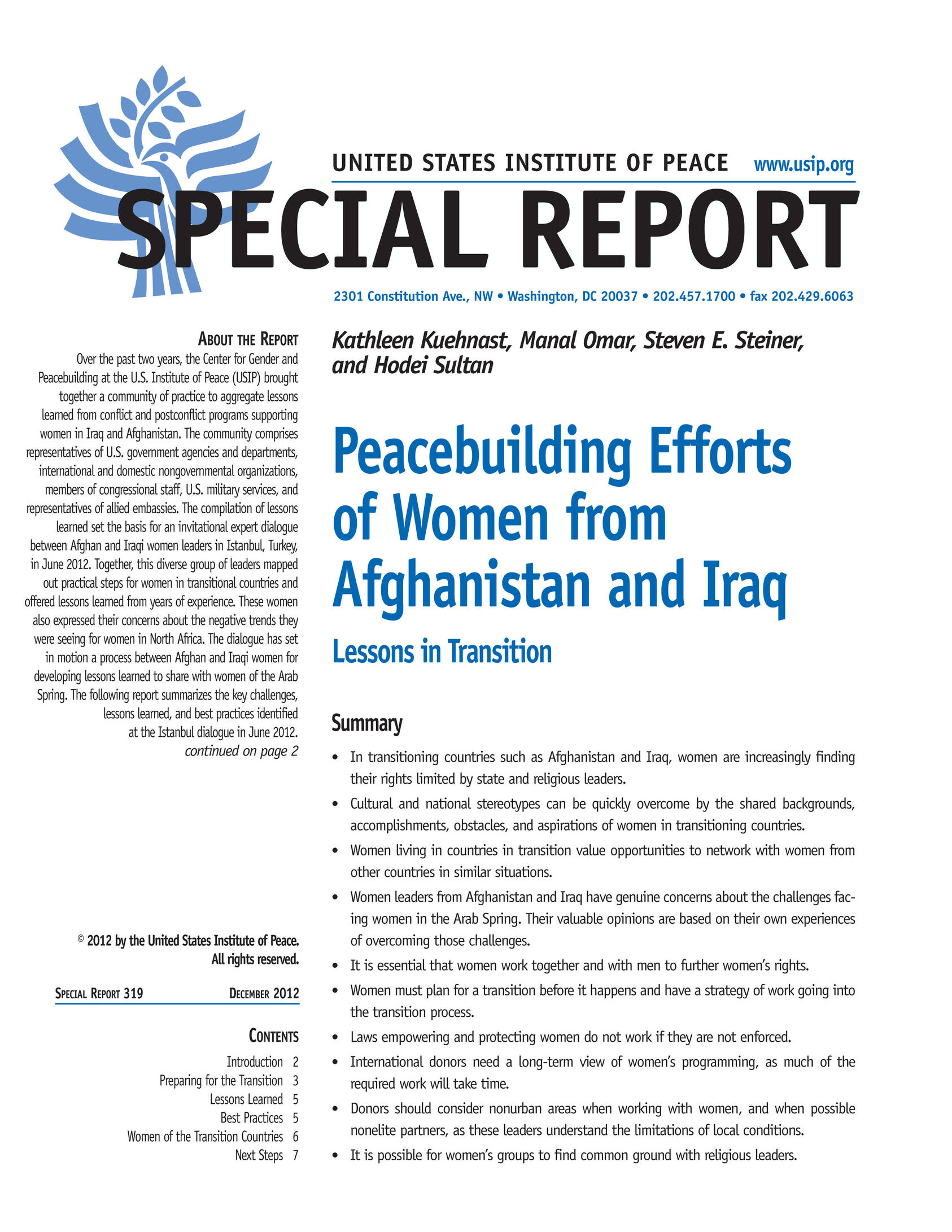Peacebuilding Efforts of Women from Afghanistan and Iraq: Lessons in Transition
Afghan and Iraqi women leaders met earlier this year to discuss how women in North African transition countries can play a role in reshaping their societies. Based on their own experiences with transition, these leaders offered advice on what to do and what pitfalls to avoid.

Summary
- In transitioning countries such as Afghanistan and Iraq, women are increasingly finding their rights limited by state and religious leaders.
- Cultural and national stereotypes can be quickly overcome by the shared backgrounds, accomplishments, obstacles, and aspirations of women in transitioning countries.
- Women living in countries in transition value opportunities to network with women from other countries in similar situations.
- Women leaders from Afghanistan and Iraq have genuine concerns about the challenges facing women in the Arab Spring. Their valuable opinions are based on their own experiences of overcoming those challenges.
- It is essential that women work together and with men to further women’s rights.
- Women must plan for a transition before it happens and have a strategy of work going into the transition process.
- Laws empowering and protecting women do not work if they are not enforced.
- International donors need a long-term view of women’s programming, as much of the required work will take time.
- Donors should consider nonurban areas when working with women, and when possible nonelite partners, as these leaders understand the limitations of local conditions.
- It is possible for women’s groups to find common ground with religious leaders.
- Political empowerment is extremely difficult if female political activists do not first achieve economic independence. Therefore, economic, social, and political empowerment are each crucial and intertwined
About the Report
Over the past two years, the Center for Gender and Peacebuilding at the U.S. Institute of Peace (USIP) brought together a community of practice to aggregate lessons learned from conflict and postconflict programs supporting women in Iraq and Afghanistan. The community comprises representatives of U.S. government agencies and departments, international and domestic nongovernmental organizations, members of congressional staff, U.S. military services, and representatives of allied embassies. The compilation of lessons learned set the basis for an invitational expert dialogue between Afghan and Iraqi women leaders in Istanbul, Turkey, in June 2012. Together, this diverse group of leaders mapped out practical steps for women in transitional countries and offered lessons learned from years of experience. These women also expressed their concerns about the negative trends they were seeing for women in North Africa. The dialogue has set in motion a process between Afghan and Iraqi women for developing lessons learned to share with women of the Arab Spring. The following report summarizes the key challenges, lessons learned, and best practices identified at the Istanbul dialogue in June 2012.
About the Authors
Kathleen Kuehnast directs the Center for Gender and Peacebuilding at USIP. Manal Omar directs the Iraq, Iran, and North Africa Programs at USIP. Ambassador Steven E. Steiner, a member of the USIP Center for Gender and Peacebuilding, served as a senior adviser in the U.S. Department of State’s Office of Global Women’s Issues. Previously, he was a senior adviser in the Office to Monitor and Combat Trafficking in Persons and director of the Department’s Iraqi Women’s Democracy Initiative. Hodei Sultan is a program officer in USIP’s Center for Conflict Management’s Afghanistan and Pakistan Program.



